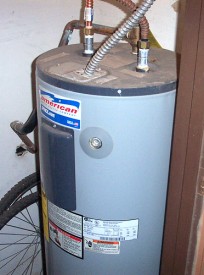
Of course, if you’re like most people, you don’t give your water heater a moment’s thought…at least, not until it stops working. And if your water heater does happen to fail, you’re faced with a quick purchasing decision—one that you don’t have time to research or think through.
Which is a shame. A water heater purchase can affect your family’s utility bills for a decade or more. Choosing an efficient model can help you save money and take control over your utility bills; after all, water heating ranks just behind space heating and cooling in overall residential utility costs. (On average, a residential hot water costs more to run each year than a refrigerator, dish washer, washing machine, and dryer combined.) And if you use electricity to heat your water—as about two thirds of households in the Northwest do—there are new models that can cut your hot water bills in half. The efficient models cost more up front, but can pay for themselves in just a few years of operation.
The biggest problem, though, is simply getting consumers to pay attention to their water heaters. And to do that, we have to know how people think about water heaters in the first place. Thus, the survey. Which you should really fill out.


Comments are closed.